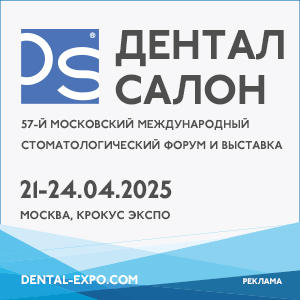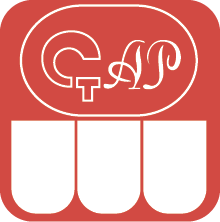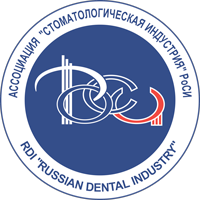DOI:
10.37988/1811-153X_2024_2_60Relationship between temporomandibular joint disc displacement and skeletal forms of malocclusion
Downloads
Abstract
Purpose — Identifying if there is any relationship between skeletal patterns of malocclusion and TMJ disc displacement.Materials and methods.
48 patients with skeletal patterns of malocclusion and no complaints about the TMJ were examined. To determine the disc position, all the patients underwent CT and MRI analysis with their mouth open and closed.
Results.
Anterior disc displacement was observed in 36 patients (75%). 4 patients (8%) out of the sample presented with Angle Class I and asymmetry of the mandibular rami, 28 patients (58%) had Class II and 26 patients (54%) of this subgroup had asymmetry of the mandibular rami, 4 patients (8%) had Class III, all with asymmetry of the mandibular rami.
Conclusion.
58% of the patients with disc displacement had Class II and 70% presented with asymmetry of the mandibular rami. It shows that this joint pathology can be asymptomatic with no outward manifestations thus resulting in higher risk of possible relapse after orthodontic treatment and/or orthognathic procedures and exacerbating TMJ disease.
Key words:
TMJ pathology, TMJ disc displacement, TMD, malocclusion, orthodontic treatment, orthognathic surgeryFor Citation
[1]
Zangieva O.T., Epifanov S.A., Shtempel M.S., Shomin E.A., Krainykova L.A. Relationship between temporomandibular joint disc displacement and skeletal forms of malocclusion. Clinical Dentistry (Russia). 2024; 27 (2): 60—64. DOI: 10.37988/1811-153X_2024_2_60
References
- Epifanov S.A. Disorders of the temporomandibular joint — it’s an interdisciplinary problem: rethinking established concepts in the practice of a maxillofacial surgeon. Bulletin of Pirogov National Medical and Surgical Center. 2020; 3—2: 102—105 (In Russian). eLIBRARY ID: 45735951
- Saccomanno S., Bernabei M., Scoppa F., Pirino A., Mastrapasqua R., Visco M.A. Coronavirus lockdown as a major life stressor: Does it affect TMD symptoms? — Int J Environ Res Public Health. 2020; 17 (23): 8907. PMID: 33266130
- Fillingim R.B., Ohrbach R., Greenspan J.D., Knott C., Diatchenko L., Dubner R., Bair E., Baraian C., Mack N., Slade G.D., Maixner W. Psychological factors associated with development of TMD: the OPPERA prospective cohort study. J Pain. 2013; 14 (12 Suppl): T75—90. PMID: 24275225
- Weiss P.F., Arabshahi B., Johnson A., Bilaniuk L.T., Zarnow D., Cahill A.M., Feudtner C., Cron R.Q. High prevalence of temporomandibular joint arthritis at disease onset in children with juvenile idiopathic arthritis, as detected by magnetic resonance imaging but not by ultrasound. Arthritis Rheum. 2008; 58 (4): 1189—96. PMID: 18383394
- Paesani D., Westesson P.L., Hatala M., Tallents R.H., Kurita K. Prevalence of temporomandibular joint internal derangement in patients with craniomandibular disorders. Am J Orthod Dentofacial Orthop. 1992; 101 (1): 41—7. PMID: 1731487
- Ahn S.J., Kim T.W., Nahm D.S. Cephalometric keys to internal derangement of temporomandibular joint in women with Class II malocclusions. Am J Orthod Dentofacial Orthop. 2004; 126 (4): 486—94; discussion 494—5. PMID: 15470352
- Park S.H., Han W.J., Chung D.H., An J.S., Ahn S.J. Relationship between rotational disc displacement of the temporomandibular joint and the dentoskeletal morphology. Korean J Orthod. 2021; 51 (2): 105—114. PMID: 33678626
- Manfredini D., Segù M., Arveda N., Lombardo L., Siciliani G., Alessandro Rossi, Guarda-Nardini L. Temporomandibular joint disorders in patients with different facial morphology. A systematic review of the literature. J Oral Maxillofac Surg. 2016; 74 (1): 29—46. PMID: 26255097
- Jeon D.M., Jung W.S., Mah S.J., Kim T.W., Ahn S.J. The effects of TMJ symptoms on skeletal morphology in orthodontic patients with TMJ disc displacement. Acta Odontol Scand. 2014; 72 (8): 776—82. PMID: 24702009
- Kwon H.B., Kim H., Jung W.S., Kim T.W., Ahn S.J. Gender differences in dentofacial characteristics of adult patients with temporomandibular disc displacement. J Oral Maxillofac Surg. 2013; 71 (7): 1178—86. PMID: 23455416
- Ooi K., Inoue N., Matsushita K., Yamaguchi H., Mikoya T., Minowa K., Kawashiri S., Nishikata S., Tei K. Incidence of anterior disc displacement without reduction of the temporomandibular joint in patients with dentofacial deformity. Int J Oral Maxillofac Surg. 2018; 47 (4): 505—510. PMID: 29305246
- Choi H.J., Kim T.W., Ahn S.J., Lee S.J., Donatelli R.E. The relationship between temporomandibular joint disk displacement and mandibular asymmetry in skeletal Class III patients. Angle Orthod. 2011; 81 (4): 624—31. PMID: 21299409
- Michelotti A., Iodice G., Piergentili M., Farella M., Martina R. Incidence of temporomandibular joint clicking in adolescents with and without unilateral posterior cross-bite: a 10-year follow-up study. J Oral Rehabil. 2016; 43 (1): 16—22. PMID: 26250478
Downloads
Received
February 9, 2024
Accepted
May 7, 2024
Published on
June 28, 2024











